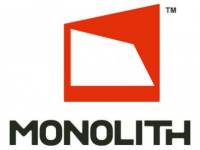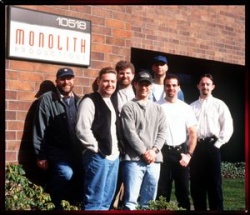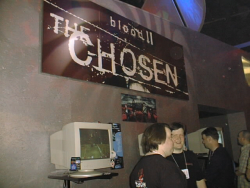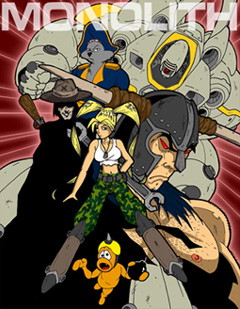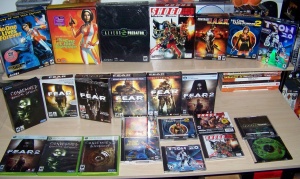Monolith Productions
"For nearly 20 years, Monolith has been bringing you high-quality games that are chock full of style and character. In a genre that has been rife with drab corridors and 'me too' stories, we stood out from the pack with a unique take on first-person shooters. Whether it was giant robots, 60’s spys, or just plain beating folks with pipes, we focused on giving players new and unique experiences. No matter how crazy the setting or bizarre the visuals, you always know that when you pick up a Monolith game, you are picking up a project that has been the focus of years of love and hard work. And some blood. Lots of blood." — Monolith Productions website
Monolith Productions (also called Monolith, MP, or just Lith) is an American video game developer, responsible for developing the Blood series. It also created the LithTech engine which was first used in Blood II: The Chosen (1998), as well as its jointly-developed sister game Shogo: Mobile Armour Division (1998). Development of this engine was later split off in 2000 to be handled by a subsidiary eventually called Touchdown Entertainment. It was founded in 1994 and quickly expanded upon the acquisition of QStudios in 1997. In 2004 it was acquired by Warner Bros. Interactive Entertainment after years of fluctuating profitability and changing publishers, including Microsoft, GT Interactive, ASC Games, Fox Interactive, Sierra Entertainment, Buena Vista Interactive, Sega and Vivendi Games. The company is based Kirkland, Washington and has employed over one hundred people, including the former developers of Snowblind Studios and Surreal Software.
Its most popular original franchise is the science fiction horror series F.E.A.R. (2005, 2009), while its has achieved more recent success with Middle-earth: Shadow of Mordor (2014) and Shadow of War (2017) using Monolith's patented Nemesis System artificial intelligence. Other releases include franchises No One Lives Forever (2001, 2002-2003) and Condemned (2005, 2008), original games such as Claw (1997) and Sanity: Aiken's Artifact (2000), as well as external properties such as Tron 2.0 (2003) and Gotham City Impostors (2012). Early on the company published titles as well, such as Rage of Mages (1998) and Septerra Core: Legacy of the Creator (1999), as well as their own Get Medieval (1998) and Gruntz (1999) using the Windows Animation Package 32 engine.
History[edit]
Beginnings[edit]
"Monolith started out as a large quantity of creativity, talent, and energy. The six of us (the 'founding members') had enough 'great' ideas to fill a dozen CD-ROMs. I'm not talking about ordinary great ideas either--I'm talking about the really good, great ideas. It was almost weird how Monolith evolved. Everything was such an unknown back then. At first, we didn't even know what we were actually making. Even so, we kept progressing very fast...towards something. Things started to take shape even though we weren't trying to shape anything specifically. There was so much creative energy at work--it was a truly incredible experience." — Brian Goble
Monolith Productions was founded in October 1994 by Brian Goble, Bryan Bouwman, Garrett Price, Paul Renault, Toby Gladwell, Brian Waite and Jason Hall in Redmond, Washington, nearby the headquarters of Microsoft. It specialized in Windows 95 computer gaming technology using CD-ROM, particularly with DirectX and ActiveX. The founders had prior experience at many notable gaming companies including 3D Realms, Sierra Entertainment, Strategic Simulations, Inc, and SquareSoft but most notably Edmark Corporation. The name was taken from the classic science fiction film 2001: A Space Odyssey and its intelligence giving monoliths.
"At the time we formed the company, DOS was still the OS of choice for games. Because of this, we knew we had to come up with a name that was 8 characters or less (for 8.3 filenames). We had been researching story and technology ideas for our demo CD and we were watching a lot of movies. "Monolith" came up, was semi mysterious, wasn't taken, and was 8 characters. Perfect." — Brian Goble
Monolith initially worked with many different types of media entertainment such as software, music, and movies, and was originally conceptualized in two parts: Monolith Games and Monolith Studios. The former is what survived, while the latter briefly focused on multimedia development ("3-D scanning, rendering, motion capture, animation, audio/video and multimedia engineering services for use in television and film, software, architecture, engineering, and science"). Monolith was also intended to operate under a philosophy of "creative freedom", where employees could make suggestions in any field of product design and feel free to contribute any of their ideas, and at heart still be gamers.
The first release Monolith created was the "Monolith CD" in 1995, which was a demo disc of games, soundtracks, and other assorted efforts inspired by the European demoscene and submitted to a Finnish contest. This was followed with the popular Windows 95 Game Sampler that Monolith had created for Microsoft at the behest of Alex St. John, as well as Game Sampler 2 which was later released at retail. During this time Monolith worked directly out of the Microsoft compound as licensed contractors, before eventually leasing out an office park in nearby Kirkland following outside investments, most notably from Takarajimasha. Monolith was also involved as a producer on the notorious 1995 adventure game Maabus commonly distributed on shovelware discs.
These efforts funded the two year development of their first game, a first person shooter called Blood, which they released on May 31, 1997. Blood had started out in early 1994 as "Horror 3D" (the version seen in the Blood Alpha) and was being developed by Q Studios, originally founded in November 1993 as Apogee West. First commissioned for 3D Realms under the creative direction of Nick Newhard, Q Studios was merged into Monolith, with whom they shared a common heritage at Edmark, in July 1996 and together they finished the game. Personal and professional disagreements with 3D Realms also lead to GT Interactive being brought in as publisher, produced by Rick Raymo.
Blood became an instant cult classic and is known as one of the big three Build engine games (the other two being Duke Nukem 3D and Shadow Warrior; sometimes Redneck Rampage is included as the big four), noted especially for its inspiration and references to gothic and slasher horror films and literature. Sunstorm Interactive then created an expansion pack for Blood called Cryptic Passage, while Monolith released their own expansion called the Plasma Pak later that same year. These were then collated together on July 15, 1998 to make the One Unit: Whole Blood compilation which the game is usually sold as today.
Monolith also developed and released a platform game called Claw in September 1997, set in a cartoonish parody of pirate fiction, which also became a cult classic, and was the first game to be self-published by Monolith (though in Japan it was distributed by erstwhile patron Takarajimasha, and was later re-released by Cryptic Passage publisher WizardWorks). The game was built upon the Windows Animation Package 32 engine, derived from the 16-bit flicker-free sprite engine first written by Brian Goble for Windows 3.1 and used in The Adventures of Microman (1993) and then utilized on the "Monolith CD"; the 32-bit engine was subsequently used in Get Medieval (1998) and Gruntz (1999). Claw also advertised itself as the first action game supporting multiplayer with up to 64 players at a time. With its foundations laid, Monolith was ready to try and expand into the mainstream.
LithTech[edit]
"When we started Lithtech and Shogo, there actually were no licensable (fully-3D) engines out there that we were aware of. There was a lot of hype about the up and coming engines, but we strongly felt that we would be better off writing our own. We were also very excited about Direct3D, which was very new and noone was using at the time. At this point, we're glad we have our own engine, but I doubt we would do it again if we had to. There were some intense hardships the whole company went through to get Lithtech to a licensable state." — Mike Dussault
Subsequent and parallel to the development of its early titles such as Blood and Claw, the company was working on a true 3D game engine component for DirectX on behalf of Microsoft, known as the "Direct Engine" and coded principally by Mike Dussault. Early versions of the technology, known as the Raycasting Algorithmic Graphical Engine, were present in the 1995 "Compound" demo as well as the interactive menus of the Game Sampler releases. They also began to work on a first person shooter game known as "Riot" for it under the watch of producer John L. Jack and later directed by Blood level designer Craig Hubbard, inspired by mecha anime science fiction. It even features an anime-style opening song, "Negai", produced by Monolith's partner Takarajimasha.
Later the deal with Microsoft fell apart and Monolith decided to develop the engine on its own, forcing them to purchase the intellectual property rights for it back from Microsoft in May 1998. Prior to this the company had also initiated the development of Blood II: The Chosen for GT Interactive, now under the direction of level designer James Wilson III, inspired by the original title's gothic horror as well as dystopian and cyberpunk films such as Blade Runner, the Hellraiser series, and The Crow. It also incorporates the Bone Leech parasite first conceived during pre-production of the first game.
The "Direct Engine" became LithTech and "Riot" became Shogo: Mobile Armour Division, after previously also being known under the names "Heavy Metal" and "Metal Tek". A promotional video for LithTech was released on April 15, 1998 that showed scenes from Blood II and "Riot" as well as scenes from two never released prototypes called "Claw 3D" and "Draedon". The former appears to have been a 3D platformer based on the earlier Monolith title (reputedly later evolving into 2008's Nikita: The Mystery Of the Hidden Treasure), and the latter appeared to be a third person medieval fantasy fighting game. Another title, called Mindbender, was also said to be in development using the engine.
"One thing I get asked a lot by Claw fans is, “What ever happened to the Claw 3D sequel?” which can be seen in the video... This was one of a few game prototypes I made in Monolith’s LithTech engine when we were deciding what games to work on next. Unfortunately, the platform game enthusiasts at Monolith were far fewer in number than the first person shooter folks and therefore other games continued to show a higher perceived ROI in internal pitch meetings than Claw 3D, all factors considered." — Kevin Lambert
The development of Blood II was remarkable due to the amount of community involvement, with the developers polling the previous game's fan base on various issues. However, the year 1998 was a very busy year in the first person shooter industry with titles like SiN, Half-Life, and Unreal coming out during the same period as Blood II and Shogo. Due to this the two games, which were both highly ambitious, were rushed out to market, which caused vast amounts of content to be removed from the games' designs, most notably in Blood II which suffered from never receiving the full planned development support of "team Shogo" following the other's release.
Shogo received overall positive reviews in the video game press (being praised for its unique style, influences, and narrative, though criticized for its weaker multiplayer aspect and unnuanced gameplay) and Blood II received mixed reviews (praised for its homage to traditional shooters, dark humour, and multimedia but criticized for its changes in style from Blood, bugs, and unimplemented features), but both did not sell as well as hoped.
This was due to a number of reasons; the amount of competition, the company's obscurity compared to Epic or Valve, the amount of bugs due to the rushed releases (which led to the necessity of many patches) and the lack of a strong marketing campaign; Monolith self-published Shogo after cutting ties with Microsoft, while relations between GT and Monolith grew strained during the release of Blood II. Monolith is still noted in computer gaming history for the finalization and release of its own in-house engine and two games for it simultaneously in the same year.
Publishing[edit]
"Monolith is the little guy out there who was given a small chance to make it. We are doing the best that we can on all fronts, and when an opportunity presents itself for Monolith to aid/publish/promote another developers work (and it makes financial sense for us) we will do it. Also it is important for us as a new publisher to have a reasonable amount of products continuously moving through our new channels/relationships. We will only do this with kick ass titles that we feel we can best serve and promote. Right now it's not our plan to be a huge publisher. We have found a comfortable position in being a small publisher, self-publisher and just developer - BUT - you never know what the future may hold!" — Jason Hall, March 22-26, 1999
Having self-published Claw and Shogo, Monolith also published Rage of Mages by Nival Interactive in the West in 1998. It also was the Western publisher of that game's 1999 sequel Rages of Mages II: Necromancer. Monolith expanded its publishing operation further with titles like Septerra Core: Legacy of the Creator and Gorky 17 (aka Odium). They also developed and self-published a Gauntlet-like action game called Get Medieval in August 1998, just prior to Shogo and Blood II, which was a well received if derivative game which was only moderately purchased.
Two expansion packs for Shogo and one for Blood II were under development by three different groups, but all never reached completion (though all, eventually, released raw files). "Loki" Blackman also attempted to create ports of the games to Linux and other platforms, work that was eventually realized for Shogo by the Hyperion Entertainment ports released in 2001. Monolith then created its own expansion pack for Blood II called The Nightmare Levels, which it released in August 1999 partly as a means of distributing patches. This also continued a trend started with the Plasma Pak, which used development ideas from Blood, by implementing many unfinished or discarded elements from the Blood II development. Despite considerable demand from fans, Monolith has not made any further sequels to its 1990s titles, though many of them still possess a dedicated cult following.
"One last unique thing about Gruntz is that we released a level editor with the game. Because of this, there is a cult of several hundred players who are still playing the game and are still creating new levels for it even now, over 20 years later!" — Kevin Lambert
Monolith also developed and published the puzzle strategy game Gruntz (initially pitched by Nick Newhard) which was released in February 1999 and was met by some success. Another game called TNN Outdoor Pro Hunter 2 was developed on LithTech by Monolith as well and published on November 4, 1999 for ASC Games as a sequel to 1998 hunting game by DreamForge Intertainment that used the competing Unreal Engine; Kevin Kilstrom lists it on his resume as well as Rocky Mountain Trophy Hunter 2 for Sunstorm Interactive. None of the games based on the WAP32 engine have been re-released digitally, but the outside games Monolith published have made their way to GOG.com.
Monolith ceased to publish its own or sign on third-party games to publish after the departure of producer Matt Saettler in July 1999; Interplay and Monolith entered a distribution deal for these titles revealed on June 1, 1999. Meanwhile, breakdowns with GT Interactive following the release of Blood II and GT's pending acquisition by Infogrames (who poached producer John L. Jack) left the studio's external publishing status in limbo as they continued work on their next projects. Jason Hall, then CEO of Monolith, finally signed a last minute deal with Fox Interactive announced on August 24, 1999 after four prior attempts with other publishers. Producer and later CEO Samantha Ryan has admitted that at that point the company was two weeks away from bankruptcy.
Reorganization[edit]
"Based on that solid business decision (and many others to follow), Monolith is still here today making games. Monolith has never missed a payroll, and everyone who has ever worked productively at Monolith and stayed for a reasonable amount of time has had his or her salary only go up! Monolith has been around now for more than half a decade, and I've seen MANY development companies come and go, not because they made bad games, but because they lacked a good business sense, and were unable to successfully navigate the tough decisions... The whole point of this discussion is that Monolith has learned a great deal from this whole fiasco, and has taken many steps to ensure that something like this NEVER HAPPENS AGAIN." — Jason Hall, July 10, 2000

During February 2000, whilst in the middle of a corporate reorganization and following the exit of engine head Mike Dussault to Valve Corporation (who had previously hired Jenni Grant), the development of LithTech was split off into a subsidiary called LithTech Inc., which was later renamed Touchdown Entertainment in March 2003. The end result for the main company was basically unchanged, though the new firm helped license the engine out to other developers and handled the porting of the engine to different platforms. Touchdown Entertainment even released a game dubbed Mob Enforcer in singe play and Chicago Enforcer in multi-play on July 13, 2004 for Windows and the Xbox, though Mob only got so-so reviews and Chicago was largely panned.
As the 1990s drew to a close, Monolith begun development of the No One Lives Forever series of comedic 1960s-style spy genre video games, starting with The Operative: No One Lives Forever announced at E3 1999 and released on November 9, 2000. It was based on the new second version of LithTech, version 2.5 specifically. This game proved to be a better seller than earlier LithTech titles and won several "Game of the Year" awards, leading to a special "Game of the Year" version of it to be released. The game was also widely praised for its innovations in gameplay, as well as its narrative, characters and comedic tone. 2000 also saw Monolith release the top-down shooter game Sanity: Aiken's Artifact from the remnant of the Blood II team (and designed by Gruntz lead Kevin Lambert), featuring the voice of Ice-T, which met with generally positive reviews.
"Monolith was busy making its mark in the First Person Shooter genre. However, there was a collective of folks there who were passionate about other game genres as well. If you look at the games I’ve shipped, you can clearly see I was one of those people." — Kevin Lambert
In 2001, Monolith developed and released Tex Atomic's Big Bot Battles, a third person shooter published by Real Networks (LithTech "ESD"). It was created as a launch title for the fledgling RealArcade service, an early online-only game distribution model. The game went live on May 31, 2001. Original founders Brian Goble (designer of Bot Battles), Garrett Price and Bryan Bouwman took this experience as the basis for their casual games company HipSoft, in publishing Build-A-Lot and other titles through RealArcade, with them having left Monolith in 2002 (joined by Kevin Kilstrom in 2007). Similarly, musician Daniel Bernstein formed his own casual game company Sandlot Games alongside artist Israel Evans and engineer Scott H. Pultz, after Bernstein first left Monolith for Alex St. John's WildTangent in 1999 alongside Brennon Reid, Mike Ruete, and Rick Winter.
That same year Monolith began its history of making games based directly on movie franchises with Aliens Versus Predator 2, a sequel to the earlier Aliens Versus Predator computer game developed by Rebellion Developments. This was again published by Fox Interactive, the same company that released No On Lives Forever and Sanity, and also received decent reviews. A third-party expansion pack for the game entitled Primal Hunt was released in 2002 but received a tepid response from critics.
Monolith released No One Lives Forever 2: A Spy In H.A.R.M.'s Way later in 2002, powered by LithTech Jupiter, which met with the same acclaim as the first game in the series. Despite its critical and commercial success with this series, fan demands, and the open ended nature of No One Lives Forever 2, no new games have been produced (similar to the fate of Shogo and Blood II). Monolith did however release a stand-alone expansion pack called Contract J.A.C.K. in 2003, which followed a contract killer for the main game's enemy. However, it failed to receive the same reaction as the main series.
Fox Interactive was bought by Vivendi Games in March 2003, and Monolith continued their relationship with the larger company, with both the later NOLF titles published under the Sierra Entertainment label; Vivendi was later merged with Activision on July 10, 2008 as Activision Blizzard. This tangle has helped lead to No One Lives Forever remaining unavailable for sale from any major digital distribution service, a problem which has proven disappointingly intractable.
Also during 2003, Monolith made another movie derived game called Tron 2.0, published by Disney's Buena Vista Interactive and designed by Frank Rooke. It was based on the famous 1980s science fiction film Tron, featuring the voices of original cast members Bruce Boxleitner and Cindy Morgan. Despite positive reviews, the game did not sell as well as hoped and thus plans for an expansion pack and sequel were dashed; the game has however been re-released on GOG.com, a rarity among Monolith's releases of this period.
Warner Bros. Purchase[edit]
"From the moment we plugged in our first development kit in Kirkland, Washington in October, 1994, Monolith has been obsessed with combining stunning visuals, inventive narratives, and bleeding-edge tech to bring a distinct brand of gaming experiences to PCs and consoles. Starting with the first game we released, the PC side-scroller Captain Claw (which contained over an hour of hand-painted cut scenes, but who’s counting?), straight through to our most recent multi-platform shooter F.E.A.R. 2: Project Origin, our passion for storytelling and our dedication to creating unique gaming experiences has driven us to create award-winning products for you, our fans." — Monolith website
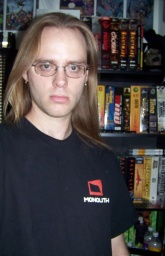
Time Warner purchased the company through its Warner Bros. Interactive Entertainment division in 2004, seven months after it hired former Monolith CEO Jason Hall as its inaugural senior vice president. He was later succeeded by Samantha Ryan in 2007, who had previously taken over the role of Monolith CEO after Jason Hall's departure there.
In 2005 Monolith made yet another movie adjacent game, this time a massively multiplayer online role-playing game produced by Joe Ybarra called The Matrix Online (LithTech "Discovery"); later that year management of this game was transferred over to Sony Online Entertainment, and the game was eventually brought offline on July 31, 2009.
Monolith also reached a landmark success in its original first person shooter field with F.E.A.R. (LithTech "Jupiter EX"), a suspense horror shooter that cemented the company's fame as a developer and received two third-party expansion packs. The game is widely regarded as one of the most successful combinations of the often contradictory genres of action and horror in a first-person game, by virtue of its thick atmosphere inspired by Japanese horror. Other hallmarks are its use of bullet time and advanced artificial intelligence focused on squad tactics. Publisher Vivendi Games released two standalone expansions developed by TimeGate Studios, Extraction Point (2006) and Perseus Mandate (2007), but these were later clarified to take place within their own continuity.
Monolith released another popular first person horror title, Condemned: Criminal Origins, on November 15, 2005, designed by Frank Rooke based on an initial pitch by Jason Hall and Nathan Hendrickson. Published by Sega, it was notably more console-oriented than previous Monolith titles, operating as a launch title for the XBox 360. This process was continued in its 2008 sequel, Condemned 2: Bloodshot, that lacked a PC version (although it now also came to PlayStation 3). This did not prevent it from receiving favourable reviews, though not rated as highly as the original. Neither Condemned is available on GOG.com, although the first is on Steam. That same year the company launched the Monolith Forums which replaced old and broken individual forums for their legacy titles.
Monolith also began working on a sequel to F.E.A.R., a lengthy development cycle complicated by trademark issues, as the F.E.A.R. title was owned by Vivendi while Monolith and new owner Warner retained the intellectual property. Released in February 2009 using the reacquired main title and earlier place-holder as a subtitle, F.E.A.R. 2: Project Origin received modestly positive reviews, despite complaints from some quarters for toning down the game's horror aspect. A short direct download add-on, Reborn, was released on September 3, 2009; the first two F.E.A.R. games and their expansions are currently available from GOG.com. Monolith took down its website and marked it as under "quarantine" soon after, sparking much speculation as to what its next project would be. The Touchdown Entertainment website also disappeared, but not before a mysterious release of the source code to the LithTech engine.
Transition[edit]
"From the moment we plugged in our first PC in October ’94, Monolith has been obsessed with combining stunning visuals, inventive narratives and cutting-edge technology to bring a distinctive gaming experience to both PC and console. Starting with our first PC game, the terrifying, first-person action game Blood, straight through to our upcoming third-person action game Middle-earth: Shadow of Mordor, our passion for storytelling and dedication to creating unique gaming experiences continues to drive us to bring immersive gaming experiences to our fans." — Monolith Productions website
The Monolith website returned in February 2010 and revealed some interesting clues towards the company's next projects, with two said to be in development. Rumours and then hard evidence showed that one was a third F.E.A.R. title. Speculation continued on what the other one could be, with some such as Nickolas Palsmeler noting that titles whose intellectual property was thought to be previously held by others are now being listed as copyrighted by Warner Bros. This was further confused by GOG.com getting the rights to sell Blood and Blood II that year from Atari, the inheritors of GT Interactive (via Infogrames); it was later clarified that Atari retains distribution rights, allowing for Fresh Supply in 2019, while the intellectual property now rests with Warner. Whether this would suggest the possibility for any new instalments in any of those franchises was unknown. There also continued to be suspicion that Monolith was working on a third Condemned title.
Since 2011's F.3.A.R. was developed by Day 1 Studios, developers of the console versions of the original F.E.A.R., with only supervision from Monolith, it remains unclear whether or not it was meant as one of the two mentioned projects. The game was originally to be published by Vivendi Games as a competing sequel to the first title, before being retooled by Warner into a cooperative shooter threequel, a discordant process that ultimately fractured Day 1. The game was ultimately added to GOG.com on December 16, 2022, but without multiplayer or co-operative play. Finally, the series was also briefly revisited in 2014 with the free-to-play multiplayer title F.E.A.R Online developed by InPlay Interactive for Aeria Games under license from Warner, but this was quickly shut-down in May 2015 while still in open beta.
Around the same time in 2010, Warner Bros. merged two other subsidiaries, Snowblind Studios and Surreal Software (formerly of Midway Games and one time employer of Blood II staff Ben Coleman and Boyd Post), into Monolith. All three had been based in Kirkland, and both had worked on games based on The Lord of the Rings as Monolith soon continued as its flagship franchise. Surreal also had experience with horror shooters, having developed The Suffering (2004) and its sequel The Suffering: Ties That Bind (2005); both currently available from GOG.com. This consolidation also aligned the studio firmly behind a new scheme of designing games primarily based on Warner franchises, now that existing contracts with other publishers and their earlier projects had run their course.
On May 16, 2011, the company released a press release announcing an adaptation of Warner subsidiary DC Comics characters with a new first-person shooter called Gotham City Imposters; featuring the ability to play as Batman or his arch-villain The Joker. The game was released in 2012 as a digital download with a strong multiplayer focus and heavy amounts of character customization, receiving mixed reviews. It was made available for Microsoft Windows, XBox 360 and Playstation 3. The game went free-to-play in 2012, but since then no new updates have been released. Following the end of the GameSpy service as of July 25, 2014, all Playstation servers for Gotham City Impostors have been shut down and the game is now unplayable. The game was re-released on Microsoft Windows as a free-to-play title on August 30, 2012 via Steam using Steamworks, but was removed in August 2021 and is no longer obtainable. It was also released for free as part of the Xbox Live Games with Gold program on July 1, 2014.
Also in 2012 they released Guardians of Middle-earth, a similarly team-based action game, in the form of a MOBA, but set in the The Lord of the Rings universe instead and launched only for the PlayStation Network and XBLA. It recieved mixed reviews. It is no longer available on the PlayStation Network and the servers are down as well. The game was later released for Microsoft Windows on August 29, 2013 but has since been removed from Steam.
In August 2013 designer Craig Hubbard, one of the last and most prominent employees from the early days of Monolith, left the studio to help found Blackpowder Games and work on their game Betrayer alongside five other former Monolith employees (including Blood II and Shogo veterans Brad Pendleton and C. Wes Saulsberry III). Akika Tanaka, Mike Dussault, Matt Allen, and Nathan Hendrickson are all mentioned in the special thanks. The game was delisted from Steam on May 19, 2021 but re-emerged for free on GOG.com on July 10, 2023.
Nemesis System[edit]
"At Monolith Productions, we believe in the power of player-driven storytelling to unite people. The stories our players share inspire us every day, and we are honored to take players on a unique personal journey... The Nemesis System raised the bar for player-driven storytelling and we’re excited to push the open-world genre forward, combining cutting-edge action with inventive narratives to create [games] everyone will want to play." — David Hewitt
Monolith released another title within Tolkien's legendarium, an action role-playing game entitled Middle-earth: Shadow of Mordor, on October 7, 2014. The game is set between the events of The Hobbit and The Lord of the Rings. It is powered by LithTech and launched on Microsoft Windows, PlayStation 3, PlayStation 4, Xbox 360 and the Xbox One, bridging both then present and next-gen consoles. The game was also later ported to GNU/Linux and Mac OS X by Feral Interactive, the first Monolith developed title to receive a Linux release since Shogo in 2001. Its breakout feature is the Nemesis System, a dynamic simulation of the alliances and dispositions of the player's orcish foes that can then be further manipulated and observed.
Following its critical and commercial success, it was reissued as a Special Edition and Game of the Year Edition in 2015. Two DLCs for the game have also been released, first Lord of the Hunt on December 16, 2014, and then The Bright Lord on February 24, 2015; severs were eventually shut down on December 31, 2020. Monolith began hiring in all departments to work on a "large-scale project" with indications that it would further utilize the Nemesis System. A job posting from April 8, 2016 hinted that Monolith was potentially looking into getting published on a Nintendo console.
In February 2017 it was announced that a sequel to Shadow of Mordor was in production under the title of Middle-earth: Shadow of War. It was set to be released on August 22, 2017 for North America and August 25, 2017 for Europe on PlayStation 4, Xbox One and Microsoft Windows. The game further utilizes the Nemesis System with a new class of characters called Followers that will have behaviour guided by how the player-character has interacted with them. The game was ultimately delayed until October 10, 2017, where it met reasonable success, but received lower scores than its predecessor. This was in part due to it being engulfed in the larger controversy about the inclusion of loot boxes and microtransactions in major titles, with such systems removed in July 2018.
Two story DLCs were released for the game in 2018, first Blade of Galadriel on February 6th and then Desolation of Mordor on May 8th. A smaller DLC, featuring Forthog Orc-Slayer, was released that September in memory of Monolith's executive producer Michael David Forgey, who died of cancer on March 3, 2016; this was later made free to download, after controversy over whether Monolith was profiting on the release, donating a lump sum to Forgey's family instead of only a percentage of purchases. Both Shadow games are currently available on GOG.com as of autumn 2022.
In June 2018, Warner Bros. parent company Time Warner was acquired by U.S. telecom company AT&T, and renamed WarnerMedia; the former Time Inc. properties having been sold off to new owners. This lead to speculation that the Warner Bros. games division would be sold off to pay down incurred debts, but this was later denied. Upon the company's merger with Discovery Communications in 2021 it was again rumoured that portions of the division would be spun off, but this was also refuted.
Studio head Kevin Stephens left the company in May 2021 to form a new Seattle based studio for Electronic Arts alongside former Monolith executive Samantha Ryan; Stephens started with the company back in January 1997 as a software engineer and been vice president since July 2012. He took with him Blood II and Shogo alumni Charles Wes Saulsberry III and Matt Allen. David Hewitt, previously head of Sony Santa Monica, was named the new studio head and vice president in September 2021. Shortly after it was declared it was hiring for twenty one new positions in November.
It was revealed on December 9, 2021 that Monolith Productions was making a single player open-world action game based on the DC Comics character Wonder Woman. It will feature an even further developed version of the Nemesis System, which Warner Bros has patented effective February 23, 2022 through to 2035 (filings had been attempted since 2015). Somewhat ironically, Stephens' new studio, christened Cliffhanger Games in July 2023, has been confirmed to be working on an open world game based on rival Marvel Comics character Black Panther. Responding to industry rumours, Monolith has clarified that Wonder Woman will be a self contained single-player game, rather than relying on a live service model.
Personnel[edit]
See also: Credits
- Jason "Jace" Hall (former CEO)
- Samantha Ryan (former CEO)
- Kevin Stephens (former studio head)
- David Hewitt (current studio head)
- Brian L. Goble (co-founder and creator of the Windows Animation Package 32 engine used in Claw, Get Medieval, Gruntz and the "Monolith CD")
- Peter Freese (technical director for Blood; later founded Secret Lair Studios with Nick Newhard, Kevin Lambert and Toby Gladwell)
- Nick Newhard (designer of Blood)
- James "Jay"/"Shade" Wilson III (designer of Blood II: The Chosen; later lead designer on Diablo III for Blizzard Entertainment)
- Guy Whitmore (creator of adaptive music which was first seen in Blood II and Shogo)
- Daniel Bernstein (Monolith musician and creator of the Cultist Language commonly associated with their early games)
- Nathan Grigg (Monolith musician from AVP 2 to present)
- Garrett Price (designer of Claw and Sanity: Aiken's Artifact)
- Kevin Lambert (designer of Gruntz and Sanity: Aiken's Artifact)
- Chris Hewett (producer, designer of Get Medieval and Gruntz)
- Craig Hubbard (designer of Shogo, NOLF and F.E.A.R. series)
- John L. Jack (producer of Claw and Shogo; later lead producer on Fortnite for Epic Games)
- Nathan Hendrickson (Director of Cinematics for the company)
- Eric Kohler (concept artist and "weapons expert")
- Matt Saettler (project manager and producer of published titles)
- Frank Rooke (designer of Tron 2.0 and the Condemned series)
- Mike de Plater (designer of Middle-earth: Shadow of Mordor and director on Shadow of War)
- Phil Straub (art director on Middle-earth: Shadow of Mordor and Shadow of War)
- Mike Dussault (creator of LithTech; later of Valve Corporation)
- Spencer Maiers (longtime webmaster and system administrator)
- Greg Kettell (head engineer for Blood II)
- Scott Schlegel (AI engineer for Blood II)
- Kevin Kilstrom (artist on many Monolith games)
- Bill Vandervoort (lead level designer for Blood II)
- David "Turnstiled" Kelvin (level designer for Blood II and Shogo: MAD)
- Aaron Carlson (3D animator on many Monolith games)
- Boyd Post (sound designer and additional voice in Blood II; contributor to Rage of Mages localization)
- Rachel "Loki" Blackman (Monolith coder and attempted game porter)
- Ben Coleman (level designer for Blood II, NOLF and AvP 2)
- Stephan Weyte (voice in numerous Monolith games, including Blood, Claw and Get Medieval)
Gameography[edit]
"From day one, we’ve been obsessed with combining proprietary, cutting-edge technology with inventive narratives and innovative designs to create distinct experiences for our players. We’re a focused, single-project studio backed by a global entertainment leader with a rich legacy of critically and culturally significant titles. Our Nemesis System raised the bar for player-driven storytelling and firmly established Monolith as an innovator in the open-world genre. We control our destiny through the quality and success of our games. Whether it’s the groundbreaking AI of F.E.A.R., the humor of No One Lives Forever, or the visceral action of Blood and Condemned, many of our titles are considered industry milestones to this day." — Monolith Productions
Developed[edit]
"I'm not at all a biz guy, so take this with a boulder of salt, but my understanding was that Monolith owned the IP [of NOLF] and Fox owned the name. Monolith was bought by WB, obviously, and Fox was bought by Sierra/Vivendi which was bought by Activision/Blizzard, which I seem to remember recently had some kind of divorce from Vivendi, so it would most likely take more lawyers than I want to invite into my imagination to sort it all out. Aside from Shogo, every property I worked on became mired in ownership confusion. Blood and FEAR eventually got sorted out, so maybe it's possible NOLF will someday become available again. Perhaps." — Craig Hubbard
- Wonder Woman (TBA)
- Middle-earth: Shadow of War (2017) (Microsoft Windows, Xbox One, PlayStation 4)
- Blade of Galadriel (2018) (downloadable content)
- Desolation of Mordor (2018) (downloadable content)
- Middle-earth: Shadow of Mordor (2014) (Microsoft Windows, OS X, Linux, Xbox 360, Xbox One, PlayStation 3, PlayStation 4)
- Lord of the Hunt (2014) (downloadable content)
- The Bright Lord (2015) (downloadable content)
- Guardians of Middle-earth (2012) (Microsoft Windows, Xbox 360, Playstation 3)
- Gotham City Imposters (2012) (Microsoft Windows, Xbox 360, Playstation 3)
- F.E.A.R. 2: Project Origin (2009) (Windows, Xbox 360, PlayStation 3)
- Reborn (2009) (downloadable content)
- Condemned 2: Bloodshot (2008) (Xbox 360, PlayStation 3)
- Condemned: Criminal Origins (2005) (Windows, Xbox 360)
- F.E.A.R.: First Encounter Assault Recon (2005) (Windows, Xbox 360, PlayStation 3)
- Director's Edition (2005)
- The Matrix Online (2005) (Windows)
- Tron 2.0 (2003) (Windows, Mac OS X)
- Killer App (2004) (Xbox) — Co-developer
- No One Lives Forever 2: A Spy in H.A.R.M.'s Way (2002) (Windows, Mac OS X)
- Contract J.A.C.K (2003) (stand-alone expansion prequel)
- Aliens versus Predator 2 (2001) (Windows)
- Tex Atomic's Big Bot Battles (2001) (Windows)
- The Operative: No One Lives Forever (2000) (Windows, PlayStation 2, Mac OS X)
- Game of the Year Edition (2001) (Windows)
- Sanity: Aiken's Artifact (2000) (Windows)
- TNN Outdoors Pro Hunter 2 (1999) (Windows)
- Gruntz (1999) (Windows)
- Blood II: The Chosen (1998) (Windows)
- The Nightmare Levels (1999) (expansion pack)
- Shogo: Mobile Armour Division (1998) (Windows, GNU/Linux, Mac OS X, Amiga OS)
- Get Medieval (1998) (Windows)
- Claw (1997) (Windows)
- Blood (1997) (MS DOS)
- Plasma Pak (1997) (expansion pack)
Monolith is also credited with providing "additional assistance" for Doom 95 (aka WinDoom), worked on by many later founders of Valve Corporation. They were also listed as a producer on Maabus (1995). Brian Goble's earlier The Adventures of MicroMan (1993) was featured on the Monolith CD, as was the 1995 "Compound" 3D demo.
Published[edit]
- Septerra Core: Legacy of the Creator (1999) (Windows)
- Gorky 17 (Odium in North America) (1999) (Windows, Linux)
- Gruntz (1999) (Windows)
- Rage of Mages II: Necromancer (1999) (Windows)
- Rage of Mages (1998) (Windows)
- Shogo: Mobile Armor Division (1998) (Windows, Linux, Mac OS X, Amiga OS)
- Get Medieval (1998) (Windows)
- Claw (1997) (Windows)
Third-party expansions[edit]
- F.E.A.R. Online (third party adaptation; 2014-2015, Windows)
- F.3.A.R. (third-party sequel; 2011, Windows, PlayStation 3, Xbox 360)
- F.E.A.R. Perseus Mandate (stand-alone expansion; 2007, Windows)
- F.E.A.R. Extraction Point (stand-alone expansion; 2006, Windows)
- Aliens versus Predator 2: Primal Hunt (2002, Windows)
- Shugotenshi (abortive expansion to Shogo: Mobile Armour Division)
- Legacy of the Fallen (abortive expansion to Shogo: Mobile Armour Division)
- Blood II: Revelations (abortive expansion to Blood II: The Chosen)
- Cryptic Passage (1997, MS DOS)
Combos[edit]
- "Monolith CD" (Windows)
- Windows 95 Game Sampler (Windows)
- Windows 95 Game Sampler 2 (Windows)
- One Unit: Whole Blood (MS DOS)
- The Blood Group (Windows)
- Shogo/Septerra Core Dual Jewel Case (Windows)
- F.E.A.R. Files (Xbox 360)
Monolith games have appeared in some third party game combo packs:
- Action Pack (2002) (Windows)
- MSI Multimedia Games Collection (2002) (Windows)
- The Station Access Collection (March 2006) (Windows)
Associated acts[edit]
The following are notable games and companies involving Monolith alumni.
- Early Learning House (1992-1996) (MS-DOS, Windows, Mac OS)
- Thinkin' Things (1993-1999) (Windows, Mac OS)
- Build-a-lot (2007) (Windows, Mac OS X, Nintendo DS, iOS, Android, BlackBerry OS)
- Microman's Crazy Computers (2008) (Windows)
- Snail Mail (2004) (Windows, Nintendo Wii, Mac OS X, iOS, Android)
- Cake Mania (2006) (Windows, Adobe Flash, Nintendo DS, Palm OS, Java ME, Mac OS X, PlayStation Portable, PlayStation 2, Nintendo Wii)
- Westward (2006) (Windows, Adobe Flash)
- Carcassonne (2007) (Xbox 360)
- The Suffering (2004) (Windows, PlayStation 2, Xbox)
- The Suffering: Ties That Bind (2005) (Windows, PlayStation 2, Xbox)
External Links[edit]
- Monolith Productions website
- Monolith Services (1997)
- Monolith Productions - Facebook
- Monolith Productions - YouTube
- Monolith Productions: Company Profile - BizStanding
- Article - Audiovisual Identity Database
- Monolith Productions Games By Release Date - Retro Gaming Junction
- Bryan Bouwman's Monolith page
- Game of X v.2: The Long Road to Xbox by Rusel DeMaria
Articles[edit]
- Monolith on the Move - Gamespot (May 16, 1997)
- Monolith Offers 3D Rendering, Scanning, and Motion Capture at Lowest Prices Anywhere! (August 3, 1997)
- Games Unleashed 1997 Monolith interview with John L. Jack
- More than gore - Game designers at Monolith say Blood is just the start, Puget Sound Business Journal, May 25, 1997 (M. Sharon Baker)
- Playing Alone, Puget Sound Business Journal, November 8, 1998 (M. Sharon Baker)
- Interplay and Monolith Strike Deal (April 27, 2000) - Gamespot
- Monolith: The rise, the fall, the climb back - Games Domain (July 13, 2000)
- Game plan: Warner Bros. eyes stake in Monolith, Puget Sound Business Journal, June 1, 2003 (Steve Ernst)
- Warner Bros. buys Kirkland game studio Monolith, Puget Sound Business Journal, August 12, 2004
- Kirkland game designer laying off 80 employees, Puget Sound Business Journal, June 20, 2005
- What Middle-earth: Shadow Of Mordor Means For Monolith, Game Informer, November 25, 2013
- The Best PC Game Developers of All Time, LevelSkip, April 15, 2015
- Looking back to 1994 to celebrate 25 years of Monolith Productions, TheXboxHub, October 25, 2019
- From Shogo to Shadow of War: Charting the chaotic, creative history of Monolith Productions, Retro Gamer, May 25, 2021
